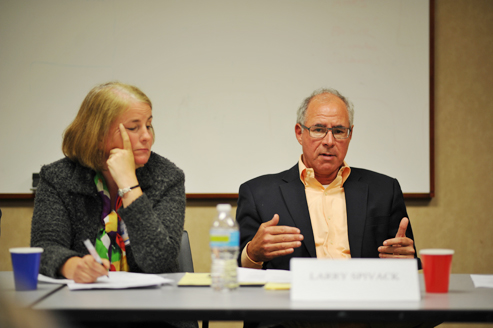
Pat Barcas photo
Larry Spivack, regional director for AFSCME Council 31, speaks about the state’s underfunded pension crisis Sept. 19 in a meeting held in Downers Grove. He said the problem is fixable if unions are at the table when a solution is worked out. Many in the packed room voiced frustration over paying into the system but not getting anything in return.
By Pat Barcas
Staff Writer
Thursday, Sept. 27, 2012
DOWNERS GROVE — There is no clear cut resolution to the state’s $83 billion pension deficit problem, a complex hole that has been dug over the past decades, caused by fund mismanagement by the state. There is more money going out than coming in, and it’s about to get a lot worse.
Hans Zigmund, association director and economist from the Governor’s office of management and budget, said pension obligations eat up about 15 percent of the state’s revenue fund each year, but that number will rise sharply soon.
“Next year, it will probably go to about 17 percent. By 2030, it will be 23.5 percent. By 2040, we will need $14 billion per year to service the pensions. That’s a lot of money under any tax structure,” he said.
Zigmund was part of a panel of speakers invited by the League of Women Voters of Downers Grove, Lisle and Woodridge to speak Sept. 19 in Downers Grove. Also speaking were Larry Spivack, regional director for AFSCME Council 31, Illinois State Senator Christine Radogno, and Richard Ingram, executive director of the state Teachers’ Retirement System.
All spoke frankly about the impending crisis to the packed room.
“Are people getting screwed? Absolutely. But we have to have this conversation,” said Ingram. “There is a lot of good in Illinois. We can fix these problems.”
Everyone agreed a solution must be met, but no specifics were discussed.
Gov. Quinn has proposed the General Assembly raise the state retirement age to 67, and to increase state employee contributions by three percentage points, which obviously doesn’t sit well with people who have paid into the pension their whole lives, expecting something in return when they retire.
“I need to hear you guys take responsibility. Every day I hear it’s me, it’s my fault, I’m taking too much. I work hard everyday, you take my sweat, my spirit, my blood, now you’re going to take my money, and it’s not fair,” said Ann Marie Coli, a state probation officer and member of AFSCME Council 31 during the question and answer session. “I’ve worked all over this county, good and bad neighborhoods. We need help out there. It’s getting bad.”
Spivack agreed, saying worker quality of life is suffering and will continue to do so until a resolution is found.
“Quality of life is what needs to be talked about here. It is a structural revenue system. We can solve much of this by eliminating corporate tax loopholes,” he said. “We should not be funding the state government by stealing from the pension system. Everyone seems to agree with that, but we still do it.”
Karen Glenn, an AFSCME Council 31 member who works for the state department of human services, said the state government has not kept any promises to her, and she’s mad about it.
“Even though I’m a public employee, I’m still a human being. How do I maintain a normal lifestyle with these wages?” she said. “Most of my friends have left the state, but I want to stay here, despite possibly losing my pension. I’m at a catch 22 — who speaks for me other than my local?”
Pat Barcas’ e-mail address is pat@foxvalleylabornews.com.
